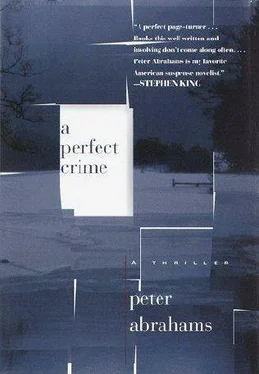Peter Abrahams - A Perfect Crime
Здесь есть возможность читать онлайн «Peter Abrahams - A Perfect Crime» весь текст электронной книги совершенно бесплатно (целиком полную версию без сокращений). В некоторых случаях можно слушать аудио, скачать через торрент в формате fb2 и присутствует краткое содержание. Жанр: Триллер, на английском языке. Описание произведения, (предисловие) а так же отзывы посетителей доступны на портале библиотеки ЛибКат.
- Название:A Perfect Crime
- Автор:
- Жанр:
- Год:неизвестен
- ISBN:нет данных
- Рейтинг книги:4 / 5. Голосов: 1
-
Избранное:Добавить в избранное
- Отзывы:
-
Ваша оценка:
- 80
- 1
- 2
- 3
- 4
- 5
A Perfect Crime: краткое содержание, описание и аннотация
Предлагаем к чтению аннотацию, описание, краткое содержание или предисловие (зависит от того, что написал сам автор книги «A Perfect Crime»). Если вы не нашли необходимую информацию о книге — напишите в комментариях, мы постараемся отыскать её.
A Perfect Crime — читать онлайн бесплатно полную книгу (весь текст) целиком
Ниже представлен текст книги, разбитый по страницам. Система сохранения места последней прочитанной страницы, позволяет с удобством читать онлайн бесплатно книгу «A Perfect Crime», без необходимости каждый раз заново искать на чём Вы остановились. Поставьте закладку, и сможете в любой момент перейти на страницу, на которой закончили чтение.
Интервал:
Закладка:
She stood in the garage, thinking, getting nowhere, and her gaze fell on the trash barrels, lined up along the wall. She began with the nearest one. It held two green plastic bags. She took out the first, unknotted the red ties, dug through, found nothing but recent garbage. Then she removed the second bag, was starting to open it as well, when she noticed the irises, crushed at the bottom of the barrel. The map of New Hampshire with the red X in the middle of the Merrimack River lay under them.
Picking his napkin off the chair and replacing it in his lap as he sat down! Roger lay on the couch in his basement HQ, his mind racing much too fast for sleep. Weren’t they aware that the proper place to leave a napkin while away from the table was to the left of the forks, folded in half, and that only a boor would leave it on his chair? Evidently not: it was symptomatic, emblematic, of the contrast between them and him. Picking the napkin off the chair, replacing it carefully on his lap, because why? Because under it was this little digital recorder, not much bigger than a credit card-birthday gift from Francie, he recalled, so he could record business ideas while in the car-spinning silently away. He rewound it and listened again, editing out background noise-laughter, cutlery clattering on china, chair legs scraping the floor-transcribing it black-and-white in his mind.
N: You never told me what a shit he is.
F: Didn’t I?
N: No. Why the hell did you marry him? Or is that out of bounds?
F: You can ask me anything. He was different then.
N: No one changes that much.
F: And maybe I misjudged him. He seemed so… original to me then.
N: Original? He’s a throwback, Francie.
F: It’s not that simple. And please, don’t bring out your tool bag. It’s been a long, slow decline, maybe worse since he lost his job, which you knew about, if I’m not mistaken.
N: I was just making conversation.
F: Were you?
N: No.
F: A long, slow decline. I didn’t realize the extent of it, until …
N: Until what?
F: Till you came in your kayak.
N: I want you.
PAUSE: laughter, cutlery on china, scraping chairs.
N (cont’d): Monday night. At the cottage.
F: Monday?
N: There’s no show-they’re broadcasting the Pops Christmas concert. Six-thirty?
LONG PAUSE: more laughter, cutlery, scraping.
R: So. What’s the plan?
Peter Abrahams
A Perfect Crime
21
Late Saturday afternoon, the sky glowing orange through the grillwork of bare black trees-oak, maple, poplar-around Little Joe Lake. Riding in his own car, a ten-year-old Bronco with 124, 000 miles on the odometer-many of the taxpayers knew Saturday was his day off, and wouldn’t care to see him swanning around at their expense in the cruiser with CHIEF on the side-Joe Savard followed the lane that ran up the east side of the lake. With snow on the ground he preferred the Bronco anyway, at least until the town came through with new tires for the cruiser. His request had been tabled till the April meeting, along with the school textbooks, the cable TV contract, and the landfill amendment. And of course the streetlight question, he added to himself, nosing over to the side to let a white pickup go by; the streetlight question, a hopeless perennial, like mud in the spring. The driver raised his hand in thanks, perhaps flashing the peace sign, although with the pickup’s windows so dirty, Savard couldn’t be sure. The body, too, although not so dirty he couldn’t read the words on the side panel: LITTLE WHITE CHURCH OF THE REDEEMER. Savard pulled back into the lane and kept going.
At one time, there’d been many Savards in the area and they’d owned the whole lake. It was probably named after a Savard: in a box somewhere lay a family Bible signed by generations of them, and they seemed to have restricted themselves to three male names, Joseph, Lucien, and Hiram; so he could have done worse. Now he was the last one, and all he owned was the single cabin built on what wasn’t much more than a big rock a few yards from shore at the north end, reached by the lop-sided little footbridge that might not last another winter. That rock being the last of the land, him being the last of the people: probably the reason he hadn’t sold the cabin back when he should have, after Sue.
Not that he’d done much reasoning during that period. He’d just left the cabin unattended for a few years, unwilling to see it or even think about it. But after his second marriage, he’d started renting the cabin out in summer, hoping to raise extra cash for some of the little things his second wife seemed to like. Later came the divorce, another good time for selling out. But it was around that time that he’d discovered his hobby, and now he drove out to the cabin almost every day off.
Savard parked at the end of the turnout that led from the lake road to the footbridge. Lifting his chain saw off the passenger seat, he stepped down and noticed that someone else had parked there, not long before. He could tell from the way the tires had pressed four deep prints in the snow after tracking in from the south, as he had-old tires with hardly any tread left at all. He followed their route with his eyes, backing out, returning to the south, through the long shadows of the trees on the snow, snow turning red-black in the dying light.
The footbridge creaked once or twice as Savard walked across. He wasn’t especially tall-six feet if he stood his straightest-but he had the broad and powerful family build. Many Savards had anchored the Dartmouth line, going back to the early years of football, although not him-he’d gone to Vietnam instead. Not by choice; he just hadn’t been able to get the kind of math scores Dartmouth required. Algebra 1, geometry, algebra 2: a maze he’d wandered through in high school without finding his way, despite never missing class, sitting in the front row, staying after for extra help, puzzling over the homework problems every night, but too often failing to solve for x. SAT math score: 470. He still remembered that goddamned number, probably the only number that had ever been solid in his mind. Four seventy led to war; war led to law enforcement, which became a profession after Sue. End of story. The truth, which had come to him years later the way truths did in his case, if at all, was that he hadn’t liked school anyway, except for sports, and would probably have disliked Dartmouth, too.
Savard opened the cabin door, went inside. It was no longer the kind of cabin anyone would want to rent. Savard had gutted it, sledgehammering all the partitions on both floors-some emotions had got loose that day, the room where it had happened, all the rooms, were now gone-ripping out the second floor itself as well, down to the structural beams. He’d left one toilet, one sink, both unusable now with the water turned off and the pipes drained for winter. The rest was space, high and open, mostly shadows at this hour, except for the red glare on the lakeside windows, a color reflected dully on the unpolished surfaces of the bears.
Savard still thought of them as bears because that was what he’d been after at the start, life-size bears carved-if cutting with a chain saw could be called carving-from the biggest cedar trunks he could find, dead standing and naturally dried when he could get it. After the divorce, those days off had gotten a little too long, and he’d gone to work once a week for a woodlot across the Maine line, not far from Kezar Falls. The work was hard; he’d been handy with a chain saw since boyhood; he got to wander around in the woods; they paid him: a good job. One evening, while he was walking back toward the logging road and his ride out, a big bear had reared up at him through the trees. He did what you were supposed to do, which was nothing. He wasn’t afraid, not with that chain saw in his hands-the noise alone would do the trick. The bear didn’t move either, as if following the same guidelines, and after watching for a minute or so, Savard realized it wasn’t a bear, but a tall tree stump that looked like a bear.
Читать дальшеИнтервал:
Закладка:
Похожие книги на «A Perfect Crime»
Представляем Вашему вниманию похожие книги на «A Perfect Crime» списком для выбора. Мы отобрали схожую по названию и смыслу литературу в надежде предоставить читателям больше вариантов отыскать новые, интересные, ещё непрочитанные произведения.
Обсуждение, отзывы о книге «A Perfect Crime» и просто собственные мнения читателей. Оставьте ваши комментарии, напишите, что Вы думаете о произведении, его смысле или главных героях. Укажите что конкретно понравилось, а что нет, и почему Вы так считаете.












